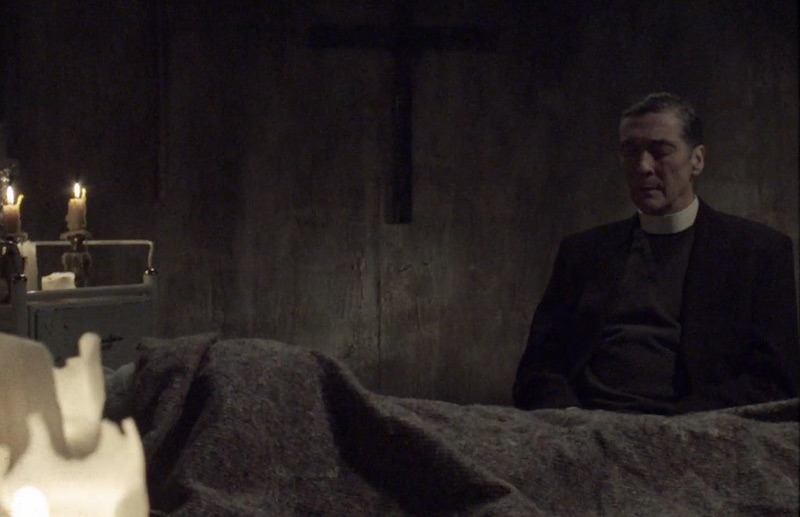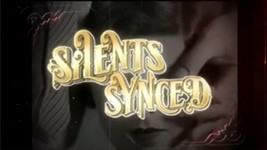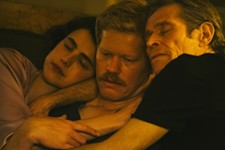Cracking Open The Devil's Doorway
Horror director Aislinn Clarke on Ireland's dirty secret
By Richard Whittaker, 4:00PM, Sat. Jul. 14, 2018
Many horror films are drawn from personal nightmares. For Aislinn Clarke, director and co-writer of The Devil's Doorway, her inspiration was a dark chapter in the history of Ireland, and how the Roman Catholic Church treated young women.
Clarke's feature directorial debut follows two priests - Father Thomas Riley (Lalor Roddy, Grabbers) and Father John Thornton (Ciaran Flynn, the young Bobby Sands in Hunger) - summoned to a nunnery to find evidence of a reported miracle. Word has spread that a stature of the Virgin Mary has been weeping blood, but what they find is less miraculous than one of Catholic Ireland's dirtiest secret: a Magdalene laundry, a place where women deemed unacceptable were confined and often worked to death.
If the story behind this found footage shocker sounds like a fantasy, it isn't. Run by Catholic orders as forced labor camps while the government turned a blind eye, the Magdalene laundries were scattered all around Ireland. Nor is this ancient history: while The Devil's Doorway is a mid-century period piece, the last Magdalene laundry did not close until 1996. Nor was it something alien and remote to Clarke. She said, "My mother had a best friend who was taken to one at 13, and they never saw her again."
Austin Chronicle: A lot of people think that shooting found footage is easier than conventional narratives, but there are a lot of technical challenges, and the selection of found footage is almost always driven by an aesthetic decision. So why did you opt for it here?
Aislinn Clarke: In some ways, it does allow you to shoot really quickly if you plan in advance what you want to do, but it does have its challenges - the biggest one being that you have to constantly sell why are they doing it, why are they holding the camera?
But it wasn't ever something that came from a desire for simplicity. That would never be my priority. It happened something like this: the producers came to me in the initial stage, and they came tho probably several different directors. They wanted to make a found footage film, probably because it is quite cheap and easy to shoot found footage, and arts of it would be set in an abandoned Magdalene laundry. It probably would have ended up something more like Grave Encounters. It would be a modern setting, where there were no longer inhabitants there, and more like ghosts of the past.
But I have always been interested in the Magdalene laundries, and the history around them, [and] I think horror films, the best ones always take advantage of the real human drama that's in there. And also the value of found footage is in the immediacy, the immersiveness of being able to put the audience in someone else's shoes. So I thought, put it back in the 1960s, at the peak of these institution, and that gives it an opportunity to have a completely different texture. I've watched loads of found footage, and loads of horror films, and I haven't seen another found footage that's period. I shoot on 16mm, and give it a new texture.
So it's a bit of a chicken-and-egg question. Found footage came first, before everything else, and this is what I pitched to them based on that. I didn't know if they'd pick it up, or think it was mad, but I felt that was the way it had to be done, and luckily for me they thought it was a good idea, and here we are.
AC: One of the most shocking moments is when one of the nuns slaps a woman hard across the face right in front of the priests.
A. Clarke: I didn't go to convent school, but one of my sisters did, and I know a lot of people that did, and everyone's like, 'Yup, that's nuns.' Not all nuns - hashtag not all nuns - but some nuns could be really nasty if they're the kind of person that's predisposed to nastiness. Because they were given ultimate power, and of course power corrupts. They were allowed to do whatever they wanted, and they were trusted fully with the care of children because they were women, and women are meant to have an instinctive, nurturing quality, they were given free reign. Of course abuse happened, and with priests as well, but it does in any context where people are given so much power, and trusted so much, and never held accountable.
AC: You also have more traditional supernatural horror themes, reminiscent of The Orphanage and The Devil's Backbone.
A. Clarke: Those are two really good references to mention, because particularly The Devil's Backbone was something I wrote around the time of the script.
AC: Considering that the Magdalene laundries are still such a fresh wound for so many people, did you ever have any concerns about adding the supernatural component to such a sensitive story?
A. Clarke: I was really keen to take on the film when it came to me, but only in the way that I felt. ... The last laundry only closed in 1996, and that's the year before I had my own son at 17. I thought, if I was born into a different family or if I'd had him a little bit sooner, I could have been one of those women who ended up in one of these places.
To me, the worst things that happen in the film are the things that human beings do. ... The horror is the treatment and abuse these women suffered, and I'm very sensitive to all that, and I hold it very dear.
A. Clarke: The Magdalene laundries are only one aspect of the terrible things that happened in Irish Catholic society. They were symptoms of the church/state apparatus, the combination of the two things created the mechanism. That's part of what the film is about for me: even if Lalor [Roddy] as Father Thomas wants to be a good priest and a good man, and that's what he wants to be, that's impossible within this system and within this society. It's the same with the nuns. Not all the nuns are bad - there is the good nun who sends the letter out, and she does want to do right by her faith - but everyone becomes a cog in the greater mechanism, and no one person can really make any huge changes.
I was asked by someone else about whether or not the church has ever admitted to these institutions having existed. The truth is that they didn't have to admit to it. It wasn't secret. Everybody knew about them. For example. my mother's friend was dragged off - and this was the horror for her as a 13 year old girl, that her best friend could be dragged off literally screaming, and put into the back of a priest's car, never to be seen again, and taken to one of these institutions. She hadn't done anything wrong. It was just because her father had remarried, her mother was dead, and the new stepmother didn't want to inherit his children, so she was just packaged off to one of these institutions. That was done under plain view. None of the adults intervened. It was part of the social system, this labyrinthine structure, in which all these terrible things could happen, and everyone had some culpability.
The Mother Superior (Helena Bereen, Don't Leave Home), she's our villain in the film, but she's only emblematic. She herself says it. She says, "You send all your dirty secrets here and expect me to hide the dirty laundry." She acknowledges that the bishops know and don't care, and she's just one part of this larger machine. If it wasn't her, it'd be someone else. That's what the real horror is about these things.
The Devil's Doorway is available on VOD now.
Coming soon on DVD:
On August 7, IFC and Shout Factory release Ryan Prows' supersleazy, super-visceral crime flick Lowlife on Blu-ray and DVD. An interwoven Rashomon-esque anthology built around luchadors, gangsters, human and oran trafficking, it's a disgustingly fun adventure into LA's scummiest neighborhoods.
Also out August 7 from IFC and Shout Factory, Pyewacket is one of the best modern Canadian horrors; in this supernatural thriller, director Adam MacDonald ties together ancient dread and family tensions in a way that summons visions of one of this year's best films, Hereditary.
Filling out this IFC/Shout trifecta is Wildling, a very European interpretation of the increasingly American sub-genre of lycanthropy as a metaphor for teenhood: however, the conventions are inverted in a surprising take on the werewolf tropes from this SXSW Midnighter (read our interview with director Fritz Böhm).
A note to readers: Bold and uncensored, The Austin Chronicle has been Austin’s independent news source for over 40 years, expressing the community’s political and environmental concerns and supporting its active cultural scene. Now more than ever, we need your support to continue supplying Austin with independent, free press. If real news is important to you, please consider making a donation of $5, $10 or whatever you can afford, to help keep our journalism on stands.
Richard Whittaker, July 21, 2018
Richard Whittaker, May 26, 2018
June 27, 2024
June 28, 2024
DVDanger, Aislinn Clarke, IFC Midnight, The Devil's Doorway, Horror Films












